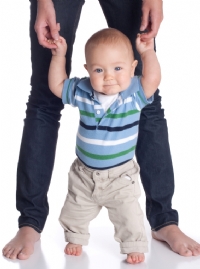Babyproofing 101
By: Pamela Brill
Looks can be deceiving. As adorable and helpless as that precious bundle of joy may appear to be, she'll soon be crawling, walking and exploring the world around her—and it's up to you to make it a safe place. Babyproofing your home will prevent any potential hazards from endangering your baby, and ultimately provide a secure environment well into the toddler years.
Start Sooner Rather than Later
According to the experts, you can never babyproof your home too soon. "Although it's extremely easy to get caught up in the excitement of preparing for a new baby, safety needs to be top of mind," says John Drengenberg, consumer safety director of Underwriters Laboratories.
Alison Rhodes of Safety Mom Solutions, a babyproofing service provider, suggests taking precautions even before bringing your child home from the hospital. "Babies start rolling and crawling at different ages, before you know it," she says. "Having certain babyproofing items in place…will alleviate a great deal of worry."
Age-by-Age
When determining which babyproofing products to purchase, Rhodes advises looking to your child's individual "safety vulnerabilities. Some are climbers, others will always try to stick things in electrical outlets, while others will put everything into their mouths," she notes. "But there are some basics that always should be considered, such as gates at the top of the stairs and window locks."
Once babies become mobile, usually between 7-9 months, child-guard latches on drawers and cabinets are advisable. "At this age, your child may be able to open and play in cabinets and drawers close to the floor," observes Drengenberg.
Room-by-Room
With products in hand, now you're ready to investigate which areas of your home pose hidden dangers. "You really want to create a 'safe zone'—an area where your baby is constantly in you line of sight, but layers of safety have been added," explains Rhodes.
Nursery set-up is extremely important, and shouldn't focus so much on aesthetics as it does on security. Rhodes recommends keeping baby's crib away from heaters and windows, and never place mounted shelves above it.
In the kitchen, keep sharp tools such as knives or scissors out of your child's reach. "Babies are very curious about their surroundings, and sharp or shiny objects may be appealing," says Drengenberg. Stoves also seem to attract inquisitive crawlers, so keep this area off limits to avoid scalding from hot foods.
Bathrooms are another hot spot for busy babies. "An open toilet is an invitation for your baby to play," says Drengenberg . Toilet-lid locks will discourage this type of exploration if your little one is especially curious.
In your living room and other places where family gathers, be sure to keep window cords tied up and out of reach. "Injuries from furniture topple-over accidents has increased tremendously, so be sure to secure all furniture to the wall," says Rhodes.
Hiring a Professional vs. Babyproofing on a Budget
If the prospect of outfitting your home properly is a concern, some parents enlist the help of a babyproofing expert who, for a fee, can handle all of your safety needs, from top to bottom. Rhodes says babyproofing is more than just a service, but a valuable tool. "It's not just about the installation of the products, but safety tips that so many parents just don't think about," she says. "I can't tell you how often we go into a home and find lose change, medicine and other dangerous objects lying on a parent's nightstand. Hiring a professional babyproofer goes a long way in keeping peace—and peace of mind in a home."
But for those D.I.Yers who may also be cost-conscious, experts offer their budget-friendly suggestions. "Always start with a gate at the top of the stairs: one that is hardware-mounted into the wall and has a self-locking latch," says Rhodes, noting that falls are the leading cause of injury for babies in the home." She also recommends securing windows with easy-to-install, low-cost window wedges and locks that can be found in hardware stores.
As for any areas that you may inadvertently overlook, it pays to act like a baby by inspecting your home from their vantage point. "Get down on your hands and knees and search for objects that may endanger your baby," explains Drengenberg. "A good rule of thumb is if it fits in a toilet paper roll, it's too small—so remove it."
